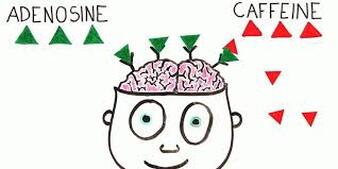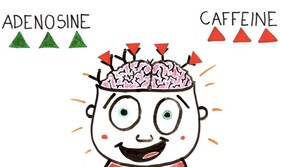|
Coffee contains caffeine. Caffeine is a drug, more specifically speaking an ergogenic aid – something that provides a mental or physical edge whilst performing physical activity. The body has naturally occurring molecules called Adenosine, which bond to receptors in the brain and have a calming effect on the nervous system. Caffeine has a similar structure to Adenosine and so when consumed, takes up the place of adenosine on its receptors. As a stimulant, Caffeine has a stimulating effect on the nervous system. Basically, caffeine tricks your brain into thinking you’re not tired, which undoubtedly has its uses. Caffeine's Benefits1) It Raises Alertness Once caffeine is circulated into the body, it stimulates the production of epinephrine (a.k.a. adrenaline), the hormone responsible for triggering the ‘fight or flight’ response. Adrenaline results in an increased heart rate, meaning blood is being pumped at a faster rate. Blood supplies oxygen to your brain, and so this increased supply leads to greater feelings of alertness. This is obviously beneficial for any task, whether it be exercise, focusing on a task at work, or studying for an exam. 2) Fat Burning When taken prior to working out, coffee consumption can increase the amount of fat you burn during exercise. The increased levels of epinephrine signals fat cells to promote the release of fatty acids into your blood. Of course, this alone will not result in the loss of fat – exercise itself and your calorific consumption play a key role. Caffeine has also been shown to increase your resting metabolic rate (the rate at which you burn calories while resting) by up to 11%. 3) Athletic Performance Whilst the exact effects of caffeine on all types of physical activity remain unclear, when it comes to endurance-based activity, caffeine is a proven performance enhancer. As mentioned in the previous benefit, caffeine stimulates our body to prioritize the use of fat stores as energy over muscle glycogen – our muscles primary source of energy. This shift towards fat stores allows for the prolonged use of working muscles, as glycogen stores are reserved. Other studies have shown that caffeine also brings about psychological benefits when it comes to endurance performance. Studies on the rate of perceived exertion (RPE) – how hard exercise feels to the participant - show that athletes who consume caffeine prior to exercise feel less fatigued and find the activity easier than athletes who don’t consume it. 4) Anti-Oxidative Powers Our bodies are consistently under attack from free radicals - unstable atoms within us that can damage cells, causing illness and provoke signs of aging. Antioxidants are chemicals that can lessen or prevent the effects of free radicals, and fortunately enough, coffee is rich in several key, powerful antioxidants. These antioxidants have been linked with reducing the risk of type 2 diabetes, liver disease, and Alzheimer’s. Drink With CautionSo clearly coffee, and more specifically caffeine, brings a whole host of benefits. However, it should be consumed with caution. Ideally, you don't want to be consuming a coffee as soon as you wake up. When we awaken, our cortisol (stress-hormone) levels are typically at their highest. By consuming caffeine we are further elevating the levels, which may have negative effects. You're more than likely better off waiting an hour or two post-awakening before having that cup of coffee, once cortisol levels have declined slightly. Additionally, I'd always recommend avoiding high sugar coffee variations available at popular chains like Starbucks. Just get yourself a black coffee! Finally, caffeine has a half life of 6 hours; it takes 6 hours for half of it to be passed through your body. This means that if you have a coffee at midday, 25% of the caffeine will still be circulating your body by midnight. Caffeine is known to have negative implications upon both our sleep quality & quantity, and if you weren't aware, our sleep is so, so important (just check out this article if you don't believe me). References:
ttps://www.healthline.com/nutrition/caffeine-and-exercise#section2 https://www.verywellfit.com/drink-coffee-to-boost-your-workouts-and-more-3121398 https://www.healthline.com/nutrition/coffee-increase-metabolism https://www.health.harvard.edu/blog/the-latest-scoop-on-the-health-benefits-of-coffee-2017092512429 |
Author
Christian Lawal Personal Training.
Personal training in Tunbridge Wells, Tonbridge & Sevenoaks. Archives
January 2024
|





